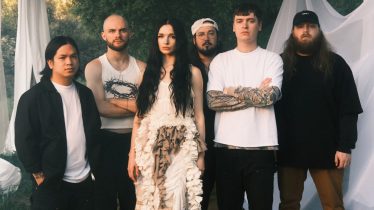Web Exclusive: A conversation with Placebo's Brian Molko
Considering the British music scene churns out more bands and trends than any five high-powered ad agencies, it’s downright revolutionary that the PLACEBO braintrust of singer/vocalist BRIAN MOLKO and bassist/keyboardist STEFAN OLSDAL has lasted for 15 years. 2007 marked a significant shift in the band’s universe: Not only were Placebo gaining popularity in the States with their 2006 release, Meds, but there was dissention in the ranks, leading to drummer Steve Hewitt’s resignation from the band. Undaunted, Olsdal and Molko enlisted 22-year-old Steve Forrest, formerly of keyboard-driven post-emo act Evaline. Invigorated by Forrest’s energy, enthusiasm and, um, naivete, the trio entered the studio with producer Dave Bottrill (Tool, King Crimson) and recorded their sixth album, Battle For The Sun, recently released in America via Vagrant. JASON PETTIGREW chatted up MOLKO about Placebo’s ability to outlive musical trends and pigeonholes; what Forrest brings to the party; and what the future holds for Placebo Mk. III.
The British press has this infuriating stance where they’re compelled to put bands in movements of their imagined design. A bunch of drunken rock critics go down to some bar in Camden and decide who’s going to be the shit that month, that year or whatever. Yet, it’s interesting that a band like Placebo has existed 15 years.
Yeah, Stefan and I started writing songs together in ’94, so it’s been 15 years.
From when the first record came out till now, I’ve heard Placebo described as a “noise-pop” band, a “quintessential goth” band, a punk band and “an under-produced heavy metal band.”
[Laughs.] We’ve always existed kind of outside… to the left of the mainstream, I suppose. It’s always been difficult to put us in a box, which is why there are so many tags attached to us, but I find that very encouraging. It means that we have a singular vision that we kind of follow. We make music on our own terms; we follow our own path, unaffected by movements, trends, fashion and music. And I think that’s what’s enabled us to survive.
Now look at two other British bands who have been around for a lot longer then we have. They’re still releasing records today, and they’re still releasing records that are vital. Those two bands are the Cure and Depeche Mode. They’ve just kind of followed their own path throughout their entire career, doing things by their own rules, unaffected by what’s cool, what’s hip, what’s happening, and they’re still around today releasing records that are worth listening to. I don’t want to be hip. I’ve been hip; I’ve been really un-hip; I’ve been hip again; slightly less hip. You know it’s kind of what happens after being in a band for 15 years-you’re in and out of fashion all the time.
The problem with making music that’s concerned with what’s cool and fashionable is that you go into a recording studio and you say to yourself, “What’s happening right now?” Then you make some music in that style, and by the time that music actually comes out, it’s not happening anymore, it’s not cool. We’ve kind of come to terms with the idea of being out of fashion most of the time, and got on with the beautiful business of making music that hopefully touches people’s hearts. That’s what we’re here for.
At Projekt Revolution, I saw plenty of Placebo T-shirts on fans with razored bangs and guyliner. Placebo haven’t compromised their vision and have still been able to access new cultures and new generations of music fans-which is really impressive, considering how everybody in America is so ADD-damaged.
I believe that the more personal you make something, the more universal it becomes, because we’re all essentially made out of the same emotional stuff. When you purposefully go out of your way to try and write something that is universal, you usually fall into the realm of cliché. You end up sounding like Oasis a little bit, singing this soccer-terrace chant kind of thing. For me, it has the tendency to lack a great deal of substance. Or you end up doing such unbelievably ambiguous and vague platitude–a la Coldplay–that it actually doesn’t mean anything if you’re really looking deeper. So, what we try to do is kind of keep it close to our chest and really talk about what’s obviously deep down and subconscious in us that needs to come out. Because of that sort of emotional nudity, it cuts through all the bullshit and goes directly to people’s hearts.
The title Battle For The Sun is very evocative. It could have been a great title for a box-set collection of all your records, since the band have been about moments of hope offset by unnervingly opaque darkness. Where is Team Placebo psychically these days?
Well, you know we’re in a good, positive headspace right now. I think a lot of that has to do with having new blood in the band. Steve Forrest is only 22, and it’s actually quite wonderful to be around him, because all these things that myself and Stefan have experienced over the past 15 years, he’s experiencing for the first time. That kind of childlike wonder and peaceful exuberance is very, very infectious, and he helps to pull us out of our mid-30s’ jadedness and our kind of music-business cynicism. That’s a very positive new thing in the band. I think that what we’re doing at the moment is that we’re fixing on the record is the sound of myself and Stefan rejoicing and feeling creatively un-self-conscious once more, and really relishing the freedom that we have at the moment. Right now, it’s going really well-it’s a better place then we’ve been in for the last five years.
I had friends that saw different dates of that 2007 Projekt Revolution tour. Some of them said, “They just owned it; Placebo just completely owned it.” Then there were others who said, “You know, they phoned it in.” Was that the tour that kind of widened the stress fractures between you and Steve Hewitt?
Yeah, very much so. There were times when we phoned it in, but that was because we were people who were onstage together, and we hadn’t said a word to each other in fucking months. It was very difficult to feel a sense of unity at that point. We were just like, “We can’t continue this way. It can’t be like this anymore.” The frustration, the disappointment, the lack of brotherhood and camaraderie. It was quite painful, but we had all these commitments to fulfill, and so we weren’t going to shirk away from that. It was a tough time, but that Projekt Revolution tour was the death knell for what we call Placebo Mk. II, and now we’re in Placebo Mk. III. Long may it last.
So, which song on the album about Steve’s departure?
There is none.
Aw, come on. “Kings Of Medicine?”
No, no. Not at all.
I thought “Kings Of Medicine” was like…
Forgive me for being unnecessarily brutal, but it’s a little bit pathetic if you start writing songs about ex-drummers.
[Laughs.] I know. The old joke: what do you call a guy who hangs out with musicians…
[Laughs.] I’m very careful about what I say about what happened between us, because it’s very easy for me to say things, and Steven’s not here to defend himself. We go back such a long way, and our relationship took so many different turns, it’s very difficult to give a reason for the breakdown in one sentence. Can you imagine the disappointment to kind of wake up one day and find yourself in a band with a total stranger, and that total stranger used to be your brother?
What’s interesting about Mr. Forrest is that although his time on the planet is significantly less then anybody else’s in the band, it seems that he has a vibe for where you want to take things. Was there some sort of intuition, or was it just like “Dude, let’s do this”? You talked about the fact that he hadn’t had a lot of experience being in a band, and that was something that you wanted.
We didn’t want another guy in the band who had been in seven bands and was just as cynical as we were. That was what was so attractive about Steve: We could live a little vicariously through his childlike wonder at everything happening to him for the first time. I’ve experienced things with him I haven’t experienced in 15 years. I’ve been next to him the first time he’s heard himself on the radio; I’ve been next to him the first time he’s seen himself on TV. These are amazing things, and these are things which I’ve forgotten about. That absolute rush of adrenaline, that feeling of, “My God, I’m finally getting somewhere with my life.” It’s wonderful to experience it once more. It was about finding the kind of person you want to travel the world with for two years, for 10 years, for 20 years. Is this the kind of person whose heart is in the right place, who has his motivations right, who’s doing this for the right reasons? I really believe that that’s the case with young Forrest. Sometimes it’s like being in a band with your little brother.
So, what does he do to annoy you?
He’s just so goddamn positive. He’s Californian. I just turn around to him sometimes and say, “Would you please go away and do something negative, because your positivity is really driving me crazy here. Would you please be sad for a minute?” [Laughs.] He’s just so happy to be playing drums in a band that he admires, and with people whom he respects. It’s wonderful to share that experience with him. And it’s given us a new lease on life.
Speaking of new leases, you now license your records to various labels in different territories. It’s interesting how you’re on Vagrant, the label who gave us Dashboard Confessional and Saves The Day.
When we first signed to Virgin, we were signed by a record company called Hut, which was an autonomous subsidiary of Virgin. It was a sort of boutique label that was really artist-driven. Five years later, that label’s been closed down, those people in charge have been fired and the accountants have moved in. That shift in the music industry was something that we experienced first-hand being on a major label. We decided that this time around, instead of signing to a mothership label, we were going to go from territory to territory and find the people who are as passionate about the band as we were, and get them to release our record. In terms of Vagrant, I’m very happy to be on the same label as Eels and City And Colour. It feels really right for us to be there right now. We’re coming [to America] in the fall, and [we’re going to] tear it up from a grass-roots level. I think we’re still in that kind of position in the U.S.: We still need to build it up. And that’s okay for a band like us. In fact, it’s very good for our egos and our souls to still have to work.
After all these years you still have that hunger. That you are in bigger control of your destiny then you ever were certainly helps.
Life can only get better from here. And what a blessing, after 15 years in the industry, to have this kind of second or third chance to get your shit together, and to plan for a better future for yourself, the band and as people. We are very much aware of what this band mean to people and we want to respect that. We want to give them the best we possibly can. alt








